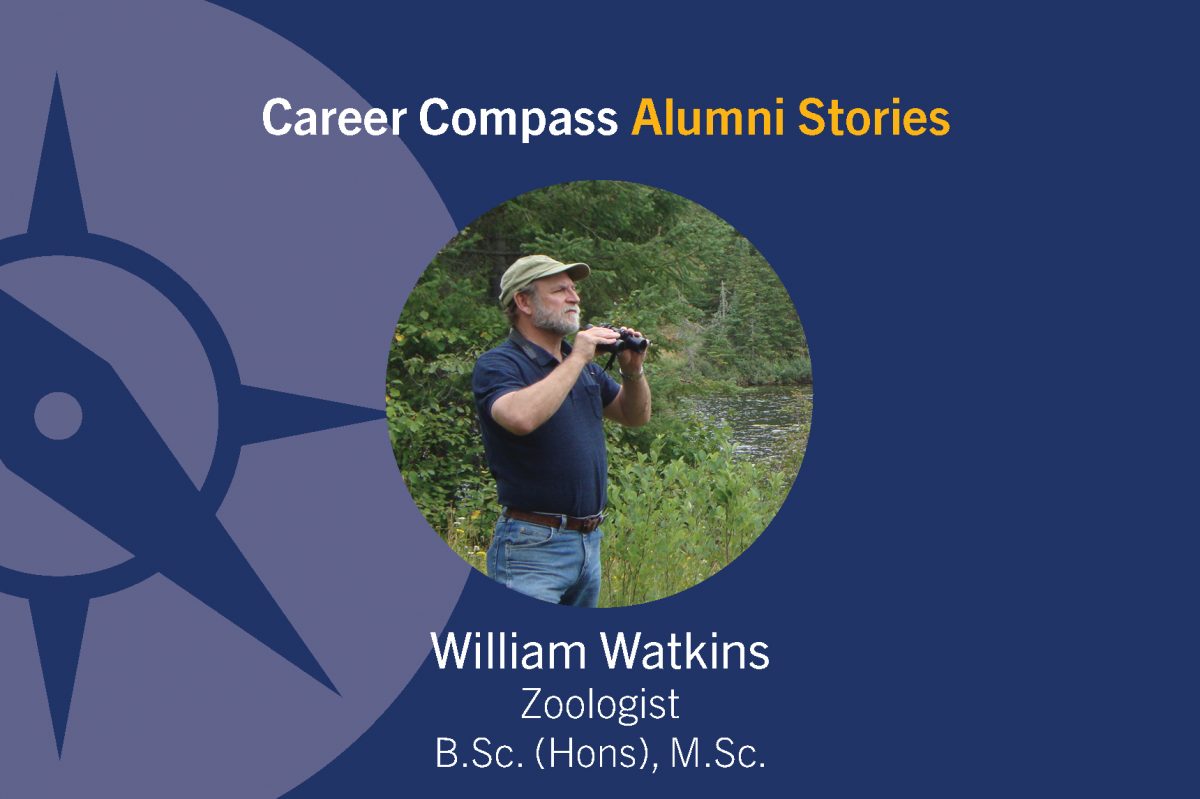
William Watkins Life Sciences Alumni
Briefly, tell us about your job. What do you find most rewarding? What are your greatest challenges within this profession?
I am a zoologist for the Manitoba government working in the biodiversity, habitat and endangered species section of the Wildlife and Fisheries Branch. My activities focus on rare species and species at risk including bio-inventory, population monitoring, conservation status assessment, recovery and management planning and the development of policy and legislation. My management projects have ranged from endangered prairie butterflies to polar bears. I am currently a member of the Committee on the Status of Endangered Wildlife in Canada (COSEWIC), the body which advises the federal Minister of the Environment on the listing of species under Canada’s national Species at Risk Act for protection. I also teach evening courses in biology and environmental studies at the University of Winnipeg.
I find working to preserve Manitoba’s biodiversity for future generations personally rewarding and I particularly enjoy being part of a group of people that bring a high level of passion and dedication to their work. One of my greatest challenges is to identify potential funding partners and build effective cooperative partnerships for the management or recovery of species at risk. Another challenge is the diversity of the organisms that I work with. There is no one-size-fits-all solution for the recovery of endangered species and I find that I must be a perpetual student learning as much as I can about each new species or group of species that I work on to develop conservation strategies.
What experiences and activities helped you to map out your career pathway?
I grew up in a family that instilled a love of nature in me and fostered an inquisitive outlook towards the natural world. When I entered university I was looking for a career in science that had an outdoor component to it. I had enjoyed biology in high school and at the end of my first year at the University of Manitoba I accepted an invitation into the zoology honours program. My first career-oriented summer job with the Canadian Wildlife Service was important in affirming my decision to become a biologist and in sparking an interest in working for government. My professors in my senior year as an undergraduate were instrumental in helping me decide to enter graduate studies after my first degree. I completed a master of science at the University of Manitoba that was primarily lab-based and applied to enter a doctoral program in eco-physiology at the University of Alberta. I left the program before completing it to accept a position with Manitoba Conservation and Water Stewardship where I have worked for over 30 years.
As a student, did you see yourself in your current career? What stayed the same and/or changed?
As a student I initially saw myself having an academic career in the sciences. My first career-oriented summer job was in government and made me realize that options other than academia existed. I am currently in a position doing exactly what I had hoped to do after graduation. However, it took a number of years working in several related but different positions before I moved into my present position. Each one of them taught me important skills that I currently apply in my work.
What advice do you have for students who are interested in pursuing a degree in biological sciences?
Life experience and practical skills are often as important as coursework and good grades for a career in wildlife biology. While at university, take every opportunity to develop outdoor skills such as camping and canoeing. Species identification is critically important to a field biologist and it isn’t usually taught in the classroom, so begin learning to identify the common birds, mammals, fish, plants and insects in your area and keep working at it until you feel confident in your identification skills. Develop the life-long habit of reading every day and read material related in the broadest sense to your chosen career.
What job search advice do you have for students and recent graduates?
Network! Join organizations related to your career and attend events to meet people. Ask them to send employment bulletins to you. There may be positions available that are not posted on the employment bulletin boards or sources that you routinely search. Look for consulting firms, government departments and non-government agencies that you might like to work for and email your resumé and cover letter to an appropriate manager. Follow up on a regular basis to inquire about employment opportunities. Find volunteer opportunities to develop new skills and build your resumé. Think about related positions that might require the core analytical, integrative and communication skills that you developed in your degree program and be open to new experiences and opportunities.
Tell us a fun fact about your career path.
I once had lunch with Canada’s Governor General as part of a team invited to discuss polar bear conservation and the role of Winnipeg’s International Polar Bear Conservation Centre in research, conservation and public education. During my career I have had the opportunity of meeting many interesting people from First Nation elders to distinguished scientists, environmental crusaders, authors, photographers and politicians.






